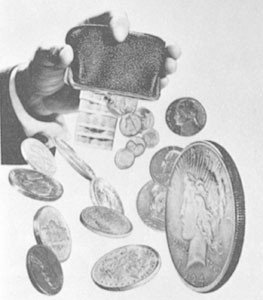Refine & Dandy
Rates low, property high; time to refinance?
By Christian M. Chensvold
ARE YOU STILL paying off your credit cards from that trip you took to Bali after college? Have you always wanted to go to Bali and would rather not max out your credit cards? Do you own a home, not just credit cards? Then maybe it’s time to consider refinancing. Thanks to Mr. Greenspan (and anyone with “green” in his name can’t be all bad), mortgage rates right now are about as attractive as that hottie who pours your coffee every morning at the local java joint, and since the rest of the world continues to consider Sonoma County a damn fine place to live, property values are up even while the stock market is down. This is the mortgage business equivalent of a planetary alignment.
Refinancing in the North Bay heated up with the summer weather, says Barry Cogbill, agent with the Warren Co., Santa Rosa mortgage brokers. The firm is having a “banner year” making money by saving you money. “Rates are excellent right now, the result of a falling economy,” he says. Interest rates are about as low as they’ve been for 10 years. “Plus equity is up. Everybody’s had 50 percent appreciation in their houses for the past two years.”
Refinancing is a term that covers both borrowing against the equity you’ve built up in your home, and simply taking advantage of lower mortgage rates to take out a new loan on your home that could save you a couple hundred dollars a month.
There are as many reasons to finance as there are people. If you’ve got an expensive car loan or a high credit-card balance at 15 percent (or worse), then it’s third-grade math to realize that paying off your high debt with a new home loan will definitely save you money. But experts offer this caution: Don’t clear your cards with a re-fi only to run off to Bali to see if it’s changed.
Perhaps you’ve got a hole in your roof big enough for Santa Claus and his reindeer. Then refinancing to make home improvements could help you in the long run by giving your property value a boost.
Your parents may have followed the old industry standard of putting 20 percent down on a house, but many people today can’t afford that. As a result, they’re often forced to take out mortgage insurance. Refinancing is a way to get rid of that extra monthly payment.
OR TAKE this scenario. One of Cogbill’s clients is a man getting ready for retirement. His house has appreciated to about $500,000. Believing that property values have peaked and that he wouldn’t qualify for prime refinancing with post-retirement income, the man decides to refinance now with a 30-year fixed rate “that he’d never have to mess with again.” The man pays a “pretty hefty” up-front cost to get a below-market interest rate. He uses some of his equity, “which is really just free money, since until you cash out it just sits there.” Since he has no plans to leave the home, his decision takes advantage of the current market climate as well as his peak income, and reduces his mortgage for his coming retirement years.
Then there’s the case of a young couple who bought a home through Cogbill last year at 8.5 percent. Since the rates have come down, he worked out a no-cost refinancing loan with no points, title, escrow, appraisal, underwriting processing–in short, no nothing. “We got them an above-market rate, but it was still less than 8.5,” he explains. “We lowered their monthly payment and they didn’t have to pay a dime.” Then just five months later, when rates came down again, the couple refinanced yet again.
So while the gentleman paid more up-front to get a rock-bottom loan, the couple paid nothing to get an above-market loan that was still less than what they were previously paying.
So with low rates and peak properties, are you a fool not to run out today, get the groceries, pick up the dry cleaning, and refinance your home? “It needs to make sense,” says Cogbill. “You compare the amount of the points–closing costs and everything–to the payment savings.”
So let’s say you’re looking at a deal to pay $4,500 up-front in fees to save $100 a month on your payment. Since it’ll take you 45 months to break even, don’t do it if you plan on moving–to Bali, for example.
IF YOUR HOME isn’t going to be home-sweet-home much longer, talk to a broker about the Young Couple Option mentioned above, and get yourself a no-cost loan. Even at an above-market rate, you could pay less than you’re paying now.
There’s one more piece of the planetary alignment. Refinancing means verifying your income all over again. So with the rate planet and property-value planet already in place, you’d better strike now if there’s any chance you may be laid off, as you’d have a hard time refinancing to lower your mortgage payment just when you need it most.
From the September 27-October 3, 2001 issue of the Northern California Bohemian.









